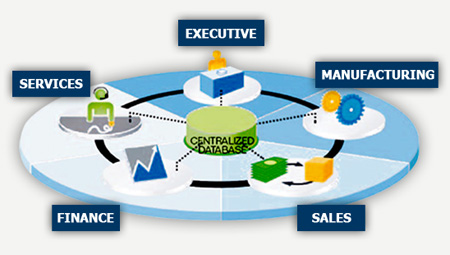In 1972, in Mannheim, Germany, three engineers had an idea. They wanted to produce a software that would mark the trend about how things should be done in the market of integrated business solutions and began a small company called Systemanalyse and Programmentwicklung. Since then, this company is called SAP (Systems, Applications and Products in Data Processing).
From the beginning, SAP has been dedicated to software for business applications. By working with business and IT executives and having partners worldwide, SAP has developed a unique way of understanding the challenges encountered in the implementation of technology solutions for business users, developing software that can help companies integrate their business processes helping the entire company to operate more orderly. The versatile and modular system of SAP can be quickly and easily adapted to new business processes so as to increase its capacity as the business grows.
“SAP has developed a software for integrating all the business processes of a company in a modular and scalable system”
Today, SAP is the largest developer of business software applications and the fourth largest independent software vendor. More than 7,500 companies in more than 90 countries chose SAP for controlling finance, manufacturing, sales, distribution and human resources.
SAP grew 41% in sales with a turnover of US $ 5 billion in 1998. During this year, SAP further consolidated its leadership position in the market for corporate software thanks to its strong strategic expansion. The company hired more than 6,500 professionals for its global staff, primarily in the areas of research and development, sales and consulting. These long-term investments would enable SAP to double its turnover in the next three years.
Why should I use SAP?
The success of your company depends on the quality of information and the speed with which it can be shared and managed. This depends on how quickly you can respond and adapt to technological changes.
And no one can give you a greater return on the information than SAP. SAP has led the industry of research and development spending 20% of their annual earnings in these activities. No wonder why they keep on presenting the most innovative solutions.
With over 1,000 business processes included in the SAP software, it can integrate your entire organization. You can share information in real time with operators, suppliers and distributors, no matter if your company has 50 or 100,000 employees. In order to take full advantage of this kind of software and use it strategically within a company it’s very advisable to study some kind of MSc in IT Strategic Management, as the use of technology for the management of information is nowadays one of the biggest competitive advantages a company can have.
SAP Strategy for SMEs
Small and medium businesses face challenges every day, which determine their strategies in the medium and long term. Their limited resources – compared with larger companies – the intense local competition and the global markets, makes small and medium enterprises need solutions to manage their business on a scalable way.
In many cases, small and medium enterprises compete with large companies simultaneously for the same customers. So they need solutions that are easy to deploy and maintain and that require few resources from the IT team.
Fast, economical and effective implementation
The SME market is part of the strategy and vision of SAP. A large percentage of all SAP customers are small and medium enterprises. Actually, SAP has more than 400 business partners who offer solutions to SMEs supported by the SAP Business Suite platform.
The strategy implemented by SAP for the small and medium enterprises market is global, and the goal is to deliver solutions specifically designed for the needs of these companies. This strategy involves the market positioning of all the developed solutions by the partners for different sectors of activities, providing vertical solutions, oriented to the main business processes and focusing on the client’s real problems, responding directly to his issues, requirements and needs.
This offer is developed by the partner and it’s completely based on his experience in the specific sector. SAP, meanwhile, will provide all the necessary tools, knowledge and support to their partners.
SAP knows the needs of small and medium enterprises and in order to respond to those needs, maintains and manages a growing number of indirect sales partners. These partners act as sector specialists, providing solutions that are responsible for ensuring what SMEs need; economic solutions, scalable for accompanying business growth, ready to be used solutions, specific solutions and so on. How about you, do you use SAP on your SME?

